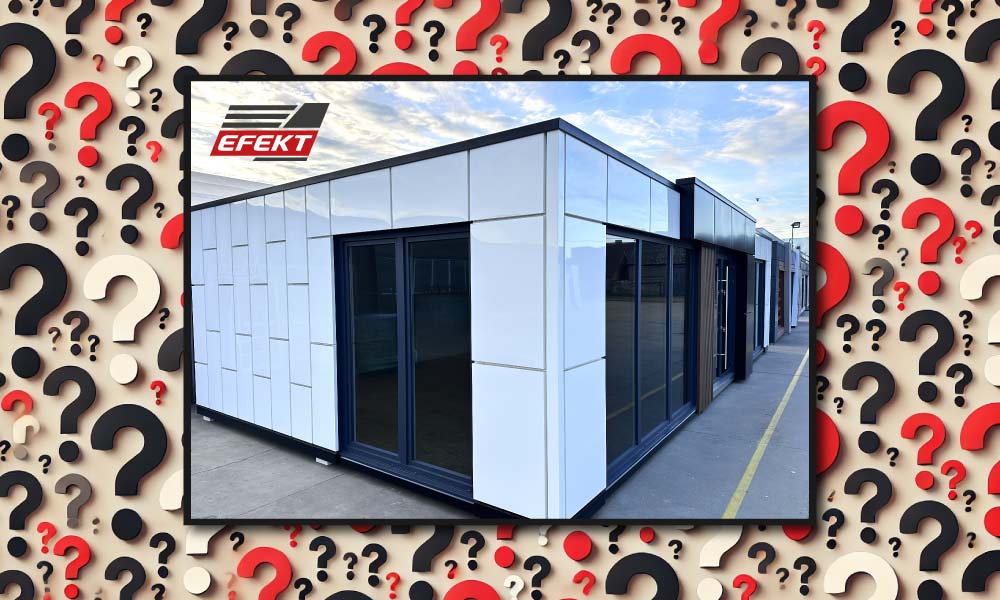Facts and Myths About Modular Buildings for Offices and Commercial Spaces
Modular buildings are gaining popularity among businesses looking for fast and economical construction solutions. Some companies choose them for offices, shops, or service points. Despite their many advantages, modular buildings still raise doubts, particularly in the B2B sector.
This skepticism often stems from numerous myths that have developed around this technology. In this article, we’ll examine the most common misconceptions and present the facts that make modular buildings an ideal solution for modern businesses.
Myth 1: Modular Buildings Are Less Durable
The first and most common myth suggests that modular buildings lack durability. Many people believe these structures aren’t as solid as traditional brick buildings. The fact is that modular buildings are made from high-quality materials that ensure structural stability and durability.
These buildings are produced using lightweight cladding technology, which is based on a steel frame, with walls and roofs made of sandwich panels, also known as Obornick panels. The core selection (either polystyrene or polyurethane) provides excellent thermal and acoustic insulation, tailored to customer needs. Additionally, these buildings don’t require foundations, which doesn’t imply less stability—lightweight steel structures guarantee safety and durability, ensuring the construction will last for many years of use.
Myth 2: Modular Buildings Are Less Aesthetic and Flexible
Another myth suggests that modular buildings lack aesthetic appeal and have limited adaptability. The fact is that with modern design solutions and a wide range of finishing materials, modular buildings can be tailored to match any company’s image and style.
Our modular office and commercial pavilions are designed with the client’s individual needs in mind. Thanks to their unique appearance, rich color schemes for decorative elements, and custom finishing trims, each pavilion can be a unique space that stands out from the competition. Additionally, if expansion is needed in the future, modular buildings can be adapted easily, allowing them to grow with changing business needs.
Myth 3: Modular Office and Commercial Pavilions Are Expensive
Many business owners believe that modular buildings are a more costly option than traditional construction. The fact is quite different. Modular buildings are cost-effective, especially considering the time and cost savings associated with construction. Traditional construction requires investment in foundations and prolonged building work, leading to higher expenses. Modular buildings, on the other hand, are produced and assembled in a shorter timeframe, reducing costs.
Since they don’t require foundations, the construction process is faster and involves fewer formalities. Moreover, modular solutions are easy to disassemble, allowing businesses to relocate the building if needed.
Myth 4: Modular Buildings Are Cold and Unsuitable for Our Climate
It’s often believed that modular buildings are cold and unsuited to changing weather conditions, such as frost, wind, or high humidity. The fact is that modular buildings are designed for maximum user comfort, and their thermal insulation is adapted to the climate where they will be used.
Thanks to the use of sandwich panels with an appropriate core, these buildings offer excellent thermal insulation. The use of polystyrene or polyurethane as an insulating core keeps the interior temperature stable, which translates into lower heating costs. Suitable sound insulation also ensures a quiet, comfortable environment, which is essential in offices or commercial spaces.
Myth 5: Modular Buildings Are Only Suitable as Temporary Solutions
Many people believe modular buildings only work as temporary structures, unsuitable for long-term use. The fact is that modular buildings can be used for many years. With a solid construction and high-quality materials used in production, our modular buildings are well-suited for long-term operation.
Businesses that choose these solutions often find that these structures not only look good and are durable but can also serve as a strategic part of their company’s image and functionality. Modular commercial or office pavilions are as sturdy as traditional buildings and can serve for many years without the need for replacement or major repairs.
Facts About the Versatility of Modular Buildings
Modular buildings are flexible solutions that are suitable for many different industries. Modular pavilions are an excellent choice for businesses with various needs, from small retail points to spacious offices or service halls. Here are some examples of applications:
- Modular Commercial Pavilions – ideal for running stores or service points. Their attractive appearance draws customer attention.
- Modular Office Pavilions – provide functional office spaces that can be easily transformed if business needs change.
- Commercial Containers – mobile solutions for businesses that operate seasonally or plan to move to different locations.
- Car Washes, Guardhouses, and Security Booths – quick-to-build and functional structures for various service industries.
- Garages and Workshops – perfect as working spaces for the automotive industry and other technical services.
Conclusion
Modular buildings for offices and commercial spaces offer innovative solutions that break traditional beliefs about construction. With modular buildings, entrepreneurs can expand their businesses quickly, economically, and aesthetically, without waiting for prolonged construction work. Modular office and commercial pavilions represent the future of flexible spaces for companies that prioritize a modern approach to development.

